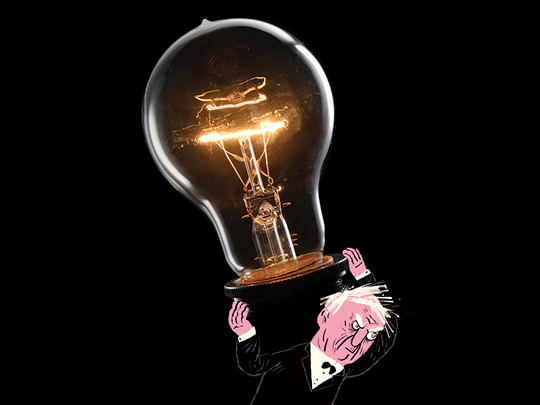
The Last Days of Night
By Graham Moore, Random House, 384 pages, $28
What makes a fictional story feel true and a true story feel fictional? This is a question I considered often while reading “The Last Days of Night”, a novel by Graham Moore, the Oscar-winning screenwriter of “The Imitation Game” and author of the 2010 novel “The Sherlockian”. His new book is a thriller built around the so-called electricity wars fought more than a century ago between the rival inventors Thomas Edison and George Westinghouse. Specifically, it explores Edison’s attempts to drive Westinghouse (and his superior A/C current) out of business. Our way into the tale is the real-life lawyer Paul Cravath, a prodigy in his mid-20s hired by Westinghouse to defend his growing empire from Edison’s attack.
Cravath arrives as an underdog on the very first page. Hurrying to a meeting with Edison, he witnesses the horrific electrocution of a workman hanging power lines. Electricity, we are told, is a mixed blessing. Encountering the great inventor, Cravath is intimidated by Edison, who appears here as a single-minded bully: “‘If you think you can stop me,’ Edison said softly, ‘go ahead and try. But you’ll have to do it in the dark’.”
Along the way, Cravath meets a high-society chanteuse named Agnes Huntington (also a real person), who falls quickly into the role of his co-conspirator. Also on the scene are two other giants of the time, Nikola Tesla and J.P. Morgan, who play important, if very different, roles in the multifronted battle. The novel’s action takes place against a backdrop rich with period detail. The late 1800s was a time when magical thinking was being replaced by wonder at the technological possibilities of the future, and Moore’s satisfying romp draws on this shift as it builds to an unexpected (if you don’t know the history) conclusion.
The novel ends with an eight-page note from the author laying out in great detail exactly which parts of the novel happened as described and which did not. Out of necessity, the time frame has been compressed, the chronology of real events fudged and some incidents invented from whole cloth. None of this is surprising. “The Last Days of Night” is, after all, a work of fiction. And yet knowing that the truth has been embroidered doesn’t precisely explain the lack of “truthiness” (to quote Stephen Colbert) I felt while reading Moore’s book.
“Truth” is a word I’ve pondered often during my tenure working on a television show called “Fargo”, based on the Coen brothers’ film of the same name. That film starts with a chyron — “This is a true story” — and my show does as well. And yet neither their story nor mine is “true”, in that the events depicted never actually happened. At the same time, my understanding of the film, and my belief as the writer of the show, is that to justify the claim, the stories must feel true. But what does that really mean?
I would argue that “plot” (which I define as the nature and order of events leading up to a story’s conclusion) is a device invented by storytellers. The actions that people take, combined with the things that happen to them, are rarely as clean and clear in a novel or a movie as the ones we experience in real life. Thrillers and mysteries are often reverse engineered from their exciting conclusions as the author goes back in time, piece by piece, to lay in the twists and turns that will, when played forward, deliver the most spellbinding reading experience and build, seemingly without effort, to an unexpected finale.
But the twists and turns of real life aren’t always so neatly resolved; our lives are subject to a barrage of random forces. And so, in writing about historical events, authors tend to streamline, to throw out the pieces that don’t add up, introducing new elements to enhance the narrative while clarifying the motivations of the players. In other words, everyone is made to row in the same direction.
Paul Auster depicted the situation facing the writer in “The Invention of Solitude”: “A young man rents an apartment in Paris and then discovers that his father had hid out in this same room during the war. If these two events were to be considered separately, there would be little to say about either one of them. The rhyme they create when looked at together alters the reality of each ... But there is more to it than just rhyme. The grammar of existence includes all figures of language itself: simile, metaphor, metonymy, synecdoche — so that each thing encountered in the world is actually many things.”
If I had one complaint about Moore’s book — which works wonderfully as an entertainment — it’s that it lacks this sense of the arbitrary and the sublime, the feeling that life is stranger and more unfathomable. “The Last Days of Night” is a novel primarily concerned with a linear series of relevant events, and it has shaped those events to have a singular meaning. As a result, the reader is unable to suspend a feeling of disbelief as Moore’s plucky underdogs scrap their way through various twists and setbacks while struggling towards their endgame. As it charges forward, the novel leaves no dot unconnected. And this makes its true story feel false.
–New York Times News Service
Noah Hawley, a screenwriter and producer, is also the author of five novels, most recently “Before the Fall”.









